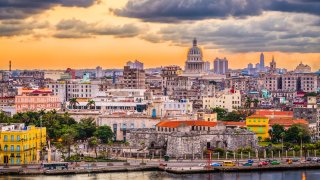The U.S. Needs A Real Cuba Policy
While Washington has hoped that Cuba will stay on the foreign policy backburner, potential political instability may make it difficult to ignore.
The downside is significant. Such a policy could give the Communist Party a new economic boost to extend its power. This would also play into the narrative in the United States that the Biden administration is naïve in its treatment of authoritarian governments, as reflected by backing off some sanctions against Venezuela in return for a promise to allow free and fair elections. The Maduro regime appears to have no intention of allowing a competitive election, barring opposition leaders and harassing their supporters.
Another option is to take an even more draconian approach to the PCC regime, with the view that it is already tottering and that the tightening of sanctions will accelerate its demise. While it may feel satisfying to punish a nasty, heavy-handed regime, such measures may not work and could leave many Cubans with a deep sense of resentment over U.S. policy, lowering the already dismal standard of living and increasing migration. This is also likely to raise concerns in related policy arenas, most notably in an already toxic debate over immigration and border control. Further hemorrhaging of Cuba’s talent does not sound like a promising basis for the hard work that will be needed to rebuild a post-Communist society.
A third option is a combination of the above, which is a more measured pragmatic approach, with an eye to the probability that the days of Communist Cuba as we know it are coming to an end. The last thing that the United States needs is another Caribbean country threatening to become a failed state. Many Cubans would like to see greater economic engagement with the United States, but they decidedly do not want to see conditions deteriorate further. One possibility could be to use technology to disrupt the regime’s ability to control the flow of information. Internet access is currently provided solely by the state-owned Empresa de Telecomunicaciones de Cuba in partnership with Venezuela. China also has a hand in providing expertise and equipment in controlling Cuba’s internet access as a part of a strategy described as “digital authoritarianism.”
U.S. policy must consider the costs and complexities of political and economic change in Cuba. The Biden administration’s hope-that-it-doesn’t-blow-up-on-my-watch approach rests on the idea that regime change in Cuba is likely to come in slow-motion fashion. The slow-moving—but deepening—crisis in neighboring Haiti underscores the dangers of such policy assumptions. It is not too early to conclude that a transition in Cuba is likely to be messier than assumed. It is not at all obvious that the U.S. administration, U.S. government agencies, and a vast universe of private groups and NGOs (and their even wider international network) have thought this through in operational detail. Regardless of the foreign policy inclinations of the next administration, now is probably the time to activate a series of comprehensive talks regarding future policy towards Cuba.
To find political order in a changing society will be difficult. Accommodating such changes will require sensitivity to the fact that the diverse visions of Cuba’s political and economic futures will neither instantly emerge nor be dictated from the outside. U.S. policymakers have their work cut out for them. However, the clock is ticking on articulating a more well-formulated policy despite the fickle winds of U.S. domestic politics. To be clear, an effective approach to Cuba policy will entail the hard work of bipartisanship—nothing less.
Dr. Scott B. MacDonald is the Chief Economist for Smith’s Research & Gradings, a Fellow with the Caribbean Policy Consortium, and a Research fellow with Global Americans. Prior to those positions, he worked for the Office of the Comptroller of the Currency, Credit Suisse, Donaldson, Lufkin and Jenrette, KWR International, and Mitsubishi Corporation. His most recent book is The New Cold War, China and the Caribbean (Palgrave Macmillan 2022).
Dr. Georges A. Fauriol is a senior associate at the Center for Strategic and International Studies (CSIS), a fellow with the Caribbean Policy Consortium (CPC), and a member of the Think Tank Haiti (TTH) Steering Group, a partnership of Université Quisqueya in Haiti and the Inter-American Dialogue. He is also a senior advisor with the United States Institute of Peace (USIP).
Image: Shutterstock.com.

